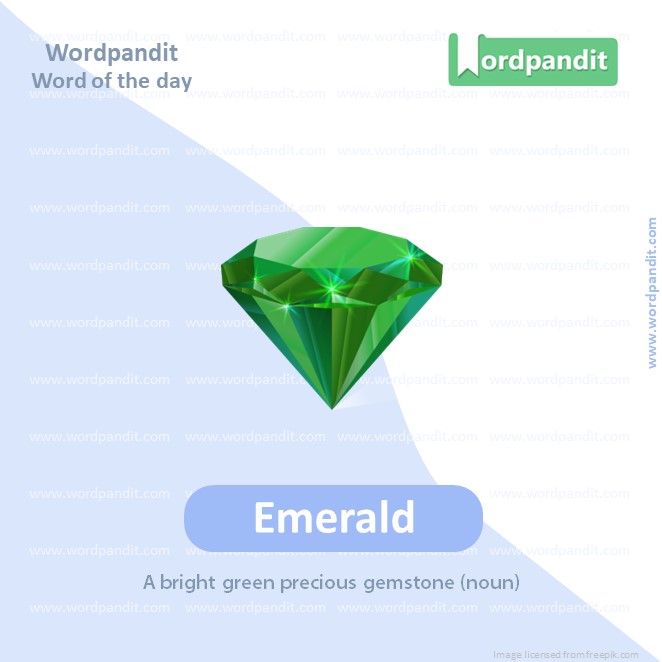Daily Vocabulary from International Newspapers and Publications
Expand Your Vocabulary with Wordpandit’s Global Vocabulary Hub
At Wordpandit, we are committed to helping you develop a truly global vocabulary by drawing from some of the most respected international publications. This section is designed to keep you ahead of the curve by introducing you to words that define global conversations and trends.
The Power of Global Sources
To help you think and communicate on a global scale, we curate vocabulary from renowned international sources, such as:
- The New York Times
- The Washington Post
- BBC
- The Guardian
- The Economist
- Scientific American
- Psychology Today
- And many more...
Stay Global, Stay Competitive
Our daily updates from international publications ensure you are consistently exposed to new words that reflect global news and developments, making sure your vocabulary is not only current but also globally relevant.
Enhance Your Global Perspective
Whether you’re preparing for international exams, aiming to excel in global business communication, or want to enhance your language skills for personal growth, Wordpandit offers the resources you need to thrive in a global context.
Effective Learning, Global Reach
Our learning methodology combines global examples, memory aids, and interactive activities, allowing you to internalize new words effectively and apply them in real-world scenarios.
Begin Your Global Vocabulary Journey Now!
Why Choose Wordpandit?
Practical Learning: Focus on words you'll actually encounter in real-world reading, enhancing your comprehension and communication skills.
Diverse Content: From current affairs to scientific breakthroughs, our varied sources expose you to vocabulary across multiple domains.
Effortless Integration: Make Wordpandit a part of your daily routine. Just a few minutes each day can significantly boost your lexicon over time.
Your Path to Vocabulary Mastery
- Visit our Daily Vocabulary section regularly
- Explore new words and their usage in context
- Practice incorporating these words into your own writing and speech
- Track your progress as your vocabulary expands
Start Your Journey Today
Embark on your vocabulary enhancement journey with Wordpandit. By consistently engaging with our daily posts, you'll build a robust vocabulary that serves you well in academic, professional, and personal contexts.
Remember, a word a day keeps linguistic limitations at bay. Make Wordpandit your daily companion in the quest for vocabulary excellence!
WORD-1: Introspection
Context:
"These are some of the big questions that always kick around at the start of January — happy new year, by the way! — a time for resolve and the serious introspection that (hopefully) precedes it." - The Washington Post
Explanatory Paragraph:
Introspection refers to the act of examining one’s own thoughts, emotions, and motivations. It involves deep self-reflection, often leading to greater self-awareness and personal growth. People engage in introspection to evaluate their actions, beliefs, or feelings, especially in moments of decision-making or personal change.
Meaning: The process of looking inward to examine one’s own thoughts and feelings (Noun).
Pronunciation: in-truh-SPEK-shun
Difficulty Level: ⭐⭐⭐ Intermediate
Etymology: Derived from the Latin word introspicere, meaning "to look inside."
Prashant Sir's Notes:
Commonly searched phrases related to "introspection" include "self-introspection," "introspection vs. reflection," and "introspection psychology." The term is often linked to personal growth, mindfulness, and self-awareness. In psychology, introspection is used as a method of self-examination to understand one’s mental and emotional state.
Synonyms & Antonyms:
Synonyms: self-examination, self-analysis, contemplation, reflection
Antonyms: extroversion, heedlessness, thoughtlessness
Usage Examples:
- After a long period of introspection, she decided to change her career path.
- Introspection is often encouraged in mindfulness practices to develop self-awareness.
- The novel’s protagonist undergoes deep introspection before making a crucial decision.
- His introspection led him to realize his past mistakes and work towards self-improvement.
Cultural Reference:
"An unexamined life is not worth living." - Socrates. This famous quote from the Greek philosopher emphasizes the importance of introspection in leading a meaningful life.
Think About It:
Do you believe introspection always leads to positive change, or can too much self-reflection be counterproductive?
Quick Activity:
Write down three moments from the past year when introspection helped you make an important decision. Reflect on how it influenced your choices.
Memory Tip:
Remember "introspection" by breaking it into "intro" (inside) + "spection" (looking), meaning "looking inside oneself."
Real-World Application:
Introspection is widely used in psychology, therapy, and personal development. It helps individuals understand their emotions, behaviors, and motivations, leading to better decision-making and mental well-being.
WORD-2: Tackle
Context:
"Our columnists are questioning, too, just on a slightly larger scale; to ring in the new year, a handful of Post Opinions writers will tackle what they see as the biggest question on their particular beat for 2024 and beyond." - The Washington Post
Explanatory Paragraph:
The word "tackle" means to confront or deal with a difficult task, problem, or challenge. It is often used in both literal and figurative senses. In sports, especially football, it refers to stopping an opponent by grabbing or knocking them down. In everyday usage, it signifies taking action to address an issue, whether in business, politics, or personal life.
Meaning: To confront, deal with, or take on a challenge or problem (Verb); an act of stopping an opponent in sports (Noun).
Pronunciation: TAK-uhl
Difficulty Level: ⭐⭐ Beginner
Etymology: Originates from Middle Dutch takel, meaning "gear" or "equipment," later evolving to mean "handling a problem or opponent."
Prashant Sir's Notes:
Commonly searched phrases with "tackle" include "tackle a problem," "tackle an issue," and "tackle synonym." It is frequently used in business, sports, and everyday conversations when referring to handling difficult situations or opponents. In football, "tackle" refers to stopping a player, while in professional settings, it often means addressing a challenge head-on.
Synonyms & Antonyms:
Synonyms: address, confront, handle, take on
Antonyms: avoid, ignore, evade, neglect
Usage Examples:
- He is determined to tackle climate change through innovative policies.
- The coach taught the players how to properly tackle their opponents during the game.
- She made a detailed plan to tackle her workload before the deadline.
- The government must tackle rising inflation to ensure economic stability.
Cultural Reference:
"Tackle the big problems first. Then, the small ones will fall into place." - A popular approach in time management, emphasizing prioritization.
Think About It:
What is one major challenge in your life that you need to tackle, and what steps can you take to address it effectively?
Quick Activity:
Write a short paragraph using "tackle" in both a literal (sports-related) and figurative (problem-solving) sense.
Memory Tip:
Think of "tackle" as "taking action" – whether it's tackling a football player or tackling a tough problem, both require effort and strategy.
Real-World Application:
"Tackle" is widely used in leadership, problem-solving, and sports. Leaders tackle challenges, students tackle exams, and athletes tackle opponents. Understanding its various uses helps in effective communication.
WORD-3: Columnists
Context:
"Our columnists are questioning, too, just on a slightly larger scale; to ring in the new year, a handful of Post Opinions writers will tackle what they see as the biggest question on their particular beat for 2024 and beyond." - The Washington Post
Explanatory Paragraph:
A columnist is a journalist or writer who regularly contributes opinion pieces or articles to a newspaper, magazine, or online publication. Unlike reporters, who primarily present facts, columnists often provide analysis, personal insights, and commentary on various topics such as politics, culture, business, or sports.
Meaning: A journalist who writes regular articles or opinion pieces for a publication (Noun).
Pronunciation: KOL-uhm-nist
Difficulty Level: ⭐⭐ Beginner
Etymology: Derived from "column," referring to a regularly appearing section in a publication, combined with "-ist," meaning a person who performs a specific role.
Prashant Sir's Notes:
Commonly searched phrases with "columnist" include "famous columnists," "political columnists," and "difference between a reporter and a columnist." Columnists are known for expressing personal opinions rather than just reporting facts. Some well-known columnists include Thomas Friedman, Peggy Noonan, and Paul Krugman.
Synonyms & Antonyms:
Synonyms: journalist, commentator, contributor, writer
Antonyms: reporter, newscaster, anchor
Usage Examples:
- The newspaper's political columnist wrote a compelling article about the upcoming election.
- She became a well-known columnist by sharing insightful opinions on social issues.
- Many readers look forward to the humor columnist’s witty take on current events.
- The sports columnist analyzed the team’s strategy in his latest article.
Cultural Reference:
Columnists have played a major role in shaping public opinion. In the 20th century, influential columnists like Walter Lippmann and Dorothy Thompson helped shape political and social discourse in the U.S.
Think About It:
Do you think columnists should prioritize objectivity, or is it acceptable for them to express strong personal opinions?
Quick Activity:
Research and name three famous columnists from different fields (e.g., politics, sports, or entertainment). What makes their writing influential?
Memory Tip:
Think of "columnist" as someone who writes a "column" regularly—just like a pillar (column) supports a structure, columnists support discussions in media.
Real-World Application:
Columnists influence public opinion and spark debate on important issues. Their work is widely read in newspapers, magazines, and online platforms, making them key voices in journalism.
WORD-4: Inoculation
Context:
"For Karen’s beat, the question refers to national political identity. For years, Karen writes, the negating mantra of ‘this is not who we are’ has been a constant inoculation against the ugliness of the MAGA movement." - The Washington Post
Explanatory Paragraph:
Inoculation primarily refers to the process of introducing a vaccine or antigen into the body to stimulate immunity against a disease. However, the term is also used metaphorically to describe protection against harmful influences, such as negative ideologies or misinformation. In the given context, "inoculation" suggests a mental or ideological defense against undesirable beliefs or movements.
Meaning: The act of introducing a vaccine or protective agent to build immunity; metaphorically, a defense against harmful influences (Noun).
Pronunciation: in-ok-yuh-LAY-shun
Difficulty Level: ⭐⭐⭐ Intermediate
Etymology: Derived from the Latin word inoculare, meaning "to graft" or "implant."
Prashant Sir's Notes:
Commonly searched phrases with "inoculation" include "inoculation vs. vaccination," "inoculation theory," and "inoculation psychology." While the medical meaning is well-known, in psychology and communication, "inoculation theory" refers to strategies used to build resistance against persuasion or misinformation.
Synonyms & Antonyms:
Synonyms: vaccination, immunization, safeguard, protection
Antonyms: infection, exposure, contamination, vulnerability
Usage Examples:
- The widespread inoculation campaign helped control the spread of the virus.
- Inoculation against misinformation is crucial in the digital age.
- She received an inoculation before traveling to a high-risk area.
- Education acts as an inoculation against ignorance and prejudice.
Cultural Reference:
The concept of inoculation dates back to the 18th century when Edward Jenner developed the smallpox vaccine. Today, the term is widely used not just in medicine but also in psychology and media studies to describe resistance-building strategies.
Think About It:
How can the idea of inoculation be applied beyond medicine to help protect individuals from misinformation and harmful ideologies?
Quick Activity:
Find and summarize a real-world example where "inoculation theory" has been used to prevent the spread of misinformation.
Memory Tip:
Think of "inoculation" as "installing immunity"—whether in the body (against diseases) or in the mind (against harmful ideas).
Real-World Application:
Inoculation is a critical concept in public health, preventing the spread of infectious diseases. Beyond medicine, businesses and educators use inoculation strategies to build resilience against misinformation, scams, and propaganda.
WORD-5: Emerald
Context:
"Anne Lamott has been reflecting on aging and death in her columns, too, and the account we published last month of a recent wintry walk of hers is full of the colors Avis pulled from: dark earth, an indigo ocean, a freezing emerald lake that invites a crystal dip." - The Washington Post
Explanatory Paragraph:
Emerald is a precious gemstone known for its deep green color, often associated with luxury, nature, and renewal. The word is also used descriptively to refer to anything with a rich green hue, such as an "emerald lake" or "emerald fields." The term is often linked to beauty, rarity, and value in both literal and metaphorical contexts.
Meaning: A bright green gemstone; something of a deep green color (Noun, Adjective).
Pronunciation: EM-uh-ruld
Difficulty Level: ⭐ Beginner
Etymology: Derived from the Old French esmeralde and Latin smaragdus, meaning "green gemstone."
Prashant Sir's Notes:
Commonly searched phrases with "emerald" include "emerald green," "emerald gemstone benefits," and "emerald city." Emerald is often associated with royalty, wealth, and nature. The term "Emerald City" is famously used in The Wizard of Oz, symbolizing a place of wonder and illusion.
Synonyms & Antonyms:
Synonyms: jade, verdant, grassy-green, lush
Antonyms: dull, colorless, pale
Usage Examples:
- She wore a stunning emerald necklace that sparkled under the lights.
- The hills were covered in emerald grass after the rainy season.
- His deep emerald eyes stood out against his fair complexion.
- The island is known for its emerald waters and white sandy beaches.
Cultural Reference:
The "Emerald City" in The Wizard of Oz is a famous reference, symbolizing a place of magical allure. Ireland is also called the "Emerald Isle" due to its lush green landscapes.
Think About It:
Why do you think the color green, especially emerald green, is often associated with wealth, luck, and nature?
Quick Activity:
Describe a place or object in your surroundings using the word "emerald" creatively in a sentence.
Memory Tip:
Think of "emerald" as a gem that shines like the greenest forests or the clearest lakes—rich, vibrant, and full of life.
Real-World Application:
Emeralds are highly valued in jewelry, and the word is often used in branding, tourism (e.g., "The Emerald Coast"), and literature to evoke imagery of beauty and richness.



















